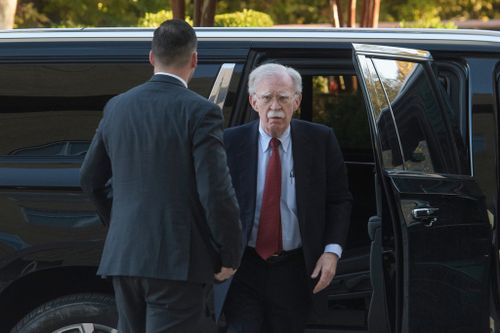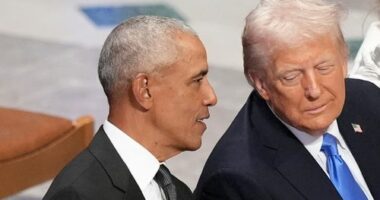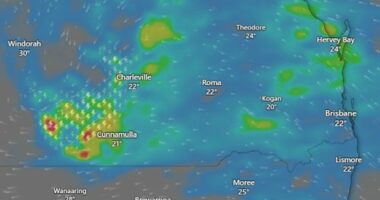Share this @internewscast.com
In recent developments, Bolton was granted release after appearing before a judge concerning the third Justice Department case in recent weeks targeting a critic of the Republican president.
This case, alleging that Bolton compromised national security, emerges amid increasing anxieties about the Trump administration potentially leveraging the Justice Department’s law enforcement capabilities against political adversaries.

Bolton has indicated his defense will assert that the charges are a reaction to his outspoken criticism of the president, characterizing them as part of Trump’s broader campaign to silence opposition.
Despite these claims, the probe into Bolton predates Trump’s second term, having been initiated well before January. Unlike other recent cases against Trump critics—often pursued by a Virginia US attorney appointed by Trump despite reservations from seasoned prosecutors—this investigation seems to have followed a more standard route to indictment.
The allegations against Bolton involve him allegedly divulging over 1,000 pages of notes containing sensitive details from his interactions with US officials, foreign leaders, and intelligence briefings to his wife and daughter.
Authorities contend that some of this information was exposed after Bolton’s email, used to share these detailed notes with his family, was hacked by operatives believed to be associated with the Iranian government.

The Justice Department also alleges Bolton stored at his home highly classified intelligence about a foreign adversary’s plans to attack US forces overseas, covert action taken by the US government and other state secrets.
“There is one tier of justice for all Americans,” Attorney General Pam Bondi said in a statement Thursday.
“Anyone who abuses a position of power and jeopardises our national security will be held accountable. No one is above the law.”
Bolton, 76, is a longtime fixture in Republican foreign policy circles who became known for his hawkish views on American power and who served for more than a year in Trump’s first administration before being fired in 2019. He later published a book highly critical of Trump.

The indictment is significantly more detailed in its allegations than earlier cases against former FBI Director James Comey and New York Attorney General Letitia James. Unlike in those cases filed by a hastily appointed US attorney, Bolton’s indictment was signed by career national security prosecutors.
Case centers on top secret national security information
Bolton suggested the criminal case was an outgrowth of an unsuccessful Justice Department effort after he left government to block the publication of his 2020 book The Room Where It Happened, which portrayed Trump as grossly misinformed about foreign policy.
Bolton’s lawyers have said he moved forward with the book after a White House National Security Council official, with whom Bolton had worked for months, said the manuscript no longer had classified information.

Authorities say Bolton took meticulous notes about his meetings and briefings as national security adviser and then used a personal email account and messaging platform to share information classified as high as top secret with his family members.
After sending one document, Bolton wrote in a message to his relatives, “None of which we talk about!!!” In response, one of his relatives wrote, “Shhhhh,” prosecutors said.
The two family members were not identified in court papers, but a person familiar with the case, who spoke on condition of anonymity to discuss nonpublic details, identified them as Bolton’s wife and daughter.
A Bolton representative told the FBI in July 2021 that his email account had been hacked by operatives believed to be linked to the Iranian government but did not reveal he had shared classified information through the account or that the hackers now had possession of government secrets, according to the indictment.

Bolton’s attorney, Abbe Lowell, said in a statement that the “underlying facts in this case were investigated and resolved years ago.”
He said the charges stem from portions of Bolton’s personal diaries over his 45-year career in government and included unclassified information that was shared only with his immediate family and was known to the FBI as far back as 2021.
“Like many public officials throughout history,” Lowell said, “Bolton kept diaries â that is not a crime.” He said Bolton “did not unlawfully share or store any information.”
Justice Department has long history of classified documents cases
The Justice Department has a history of investigations into the mishandling of classified information, including by public officials.
The outcomes of those investigations have turned in part on whether officials developed evidence of willful mishandling or other crimes such as obstruction.

Trump, for instance, was charged not only with hoarding classified documents at his Mar-a-Lago estate but also with obstructing government efforts to get them back. The case was dismissed after he took office.
Prosecutors in a separate investigation found evidence that US President Joe Biden had willfully retained classified documents but opted against charges in part because they thought Biden might come across to a jury as “sympathetic, well-meaning, elderly man with a poor memory.”

Another high-profile investigation concerned 2016 Democratic presidential nominee Hillary Clinton, who was spared charges after then-FBI Director James Comey said investigators did not determine that she intended to break the law when she sent emails with classified information on a private email server while serving as Secretary of State.
One investigation that may carry parallels to the Bolton case is the prosecution of former CIA Director David Petraeus, who in 2015 admitted to sharing classified information with his biographer. He was sentenced to probation following a plea agreement with the Justice Department.











